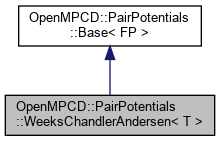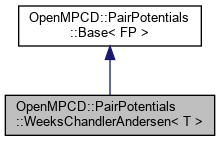Weeks-Chandler-Andersen (WCA) potential. More...
#include <WeeksChandlerAndersen.hpp>


Public Member Functions | |
| OPENMPCD_CUDA_HOST_AND_DEVICE | WeeksChandlerAndersen (const T epsilon, const T sigma) |
| The constructor. More... | |
| OPENMPCD_CUDA_HOST_AND_DEVICE Vector3D< T > | force (const Vector3D< T > &R) const |
| Returns the force vector of the interaction for a given position vector. More... | |
| OPENMPCD_CUDA_HOST_AND_DEVICE T | potential (const Vector3D< T > &R) const |
| Returns the potential of the interaction for a given position vector. More... | |
| virtual OPENMPCD_CUDA_HOST_AND_DEVICE Vector3D< FP > | force (const Vector3D< FP > &Rvec) const=0 |
| Returns the force vector of the interaction for a given position vector. More... | |
| virtual OPENMPCD_CUDA_HOST_AND_DEVICE FP | potential (const Vector3D< FP > &Rvec) const=0 |
| Returns the potential of the interaction for a given position vector. More... | |
| const OPENMPCD_CUDA_HOST_AND_DEVICE Vector3D< FP > | forceOnR1DueToR2 (const Vector3D< FP > &r1, const Vector3D< FP > &r2) const |
Returns the force exerted on the particle at r1 due to the particle at r2. More... | |
Detailed Description
template<typename T = FP>
class OpenMPCD::PairPotentials::WeeksChandlerAndersen< T >
Weeks-Chandler-Andersen (WCA) potential.
This potential has been introduced by Weeks, Chandler, and Andersen, in J. Chem. Phys. 54, 5237 (1971). DOI: 10.1063/1.1674820
It is given, as a function of the distance \( r \) of particles, and with \( \epsilon \) and \( sigma \) being parameters, by
\[ 4 * \epsilon * \left( \left( \frac{ \sigma }{ r } \right)^{12} - \left( \frac{ \sigma }{ r } \right)^{6} + \frac{ 1 }{ 4 } \right) * \theta \left( 2^{1/6} \sigma - r \right) \]
with \( \theta \left( x \right) \) being the Heaviside step function, which is \( 1 \) if \( x > 0 \), and \( 0 \) otherwise.
Definition at line 38 of file WeeksChandlerAndersen.hpp.
Constructor & Destructor Documentation
◆ WeeksChandlerAndersen()
|
inline |
The constructor.
- Parameters
-
[in] epsilon The \( \epsilon \) parameter. [in] sigma The \( \sigma \) parameter.
Definition at line 48 of file WeeksChandlerAndersen.hpp.
Member Function Documentation
◆ force() [1/2]
|
pure virtualinherited |
Returns the force vector of the interaction for a given position vector.
This function returns the directional derivative
\[ - \nabla_R V \left( \vec{R} \right) \]
where \( \vec{R} \) is the Rvec parameter, \( V \) is the potential as given by the potential function, and \( \nabla_R V \) is the gradient of \( V \) with respect to \( \vec{R} \).
- Parameters
-
[in] Rvec The relative position vector.
◆ force() [2/2]
|
inline |
Returns the force vector of the interaction for a given position vector.
This function returns the directional derivative
\[ - \nabla_R V \left( \vec{R} \right) \]
where \( \vec{R} \) is the R parameter, \( V \) is the potential as given by the potential function, and \( \nabla_R V \) is the gradient of \( V \) with respect to \( \vec{R} \).
- Exceptions
-
OpenMPCD::AssertionException If OPENMPCD_DEBUGis defined, throws ifOpenMPCD::Scalar::isZero(R.getMagnitudeSquared()).
- Parameters
-
[in] R The relative position vector.
Definition at line 69 of file WeeksChandlerAndersen.hpp.
◆ forceOnR1DueToR2()
|
inlineinherited |
Returns the force exerted on the particle at r1 due to the particle at r2.
- Parameters
-
[in] r1 The position of the first particle. [in] r2 The position of the second particle.
Definition at line 65 of file PairPotentials/Base.hpp.
◆ potential() [1/2]
|
pure virtualinherited |
Returns the potential of the interaction for a given position vector.
- Parameters
-
[in] Rvec The relative position vector.
◆ potential() [2/2]
|
inline |
Returns the potential of the interaction for a given position vector.
- Exceptions
-
OpenMPCD::AssertionException If OPENMPCD_DEBUGis defined, throws ifOpenMPCD::Scalar::isZero(R.getMagnitudeSquared()).
- Parameters
-
[in] R The relative position vector.
Definition at line 100 of file WeeksChandlerAndersen.hpp.
The documentation for this class was generated from the following file:
 1.8.17
1.8.17